SPARK Award Ceremony and Launch
At the SPARK award ceremony and launch the three top teams that proposed engineering solutions to problems that affect the society addressing the Sustainable Development Goals (https://sdgs.un.org/goals) won awards and cash prizes. This was after a year-long process of ideation and prototype development by many teams. Ten teams reached the final pitching round held on July 24, 2022. An eminent panel of judges comprising Mr. Fayaz Hudah, Mr. Chalinda Abeykon and Mr. Josh Robsen made the selection of winners.
Supun Kuruppu, Chirantha Kurukulasooriya, Dumindu Bandara, and Biyon Fernando as Team Phantom won the grand prize, a trophy and a cash prize of Rs 600,000. As the coral population throughout the world is rapidly declining due to the prevailing climate crisis and toxic human activities, Team Phantom proposed to collect the coral gametes using a robot to subsequently provide proper conditions for growth. The proposed robot automates the current process which the scientists have to undergo diving and collecting the gametes by themselves.
First runners up, Team Axon, comprised Nuwan Bandara, Sahan Hettiarachchi, Kulunu Dayasekara, Dasun Premathilake. They proposed a system to monitor the depth of anesthesia to tailor the drug administration to the individual patient, thus preventing excessive anesthetic depth and improves patients’ outcome. Second runners up, Team Fix-It, comprising Sahan Viduranga, Isuru Munasinghe, Yomali Lokugama, and Vishawa Oshadha introduced a system that continuously checks the pollutant levels of water in rivers and reservoirs. The two teams won Rs 300,000 and Rs 100,000 respectively.
Following the award ceremony, the SAPRK project launched the 2022-2023 challenge that includes the students of the Intake 2020. The event took place on July 30, 2022, at the Civil Engineering Auditorium. Mr. Heminda Jayaweera delivered the keynote address. The award ceremony and launch were educational, and exiting for all the participants.
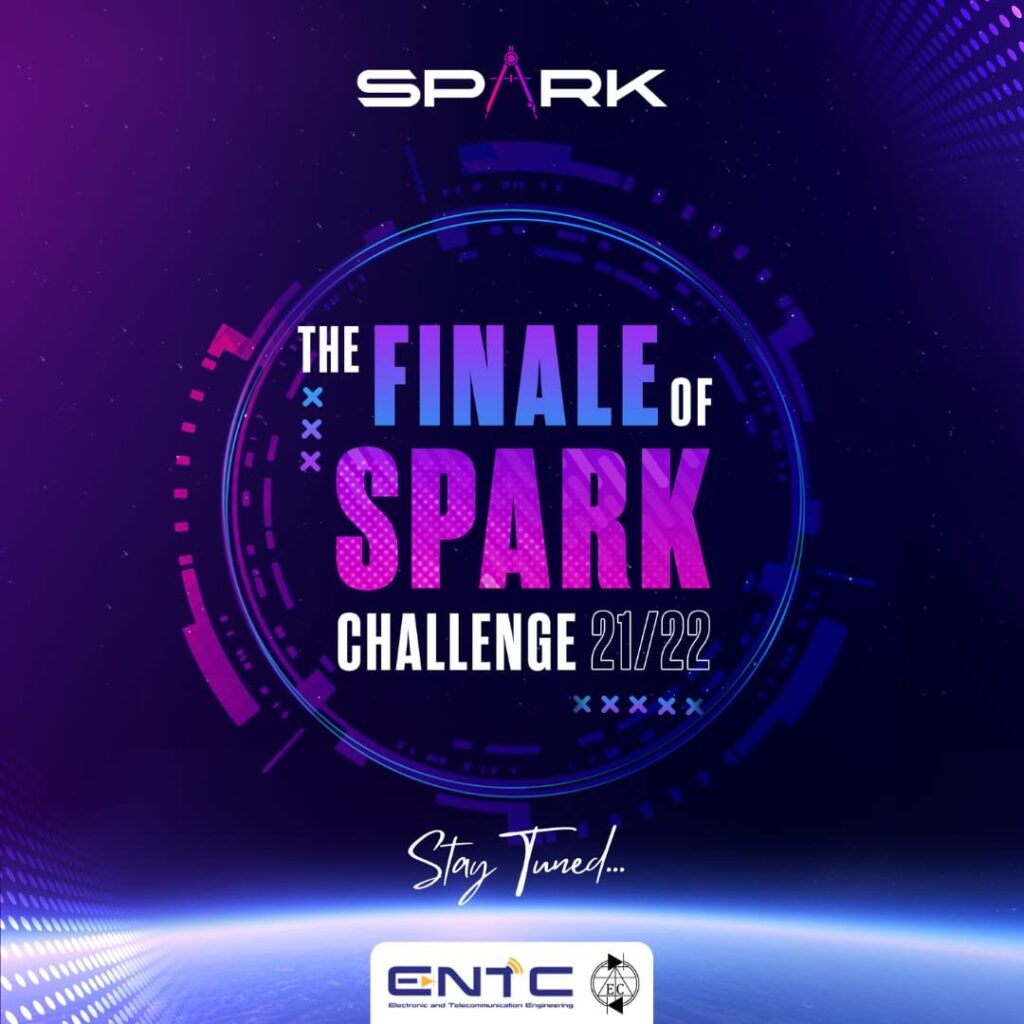
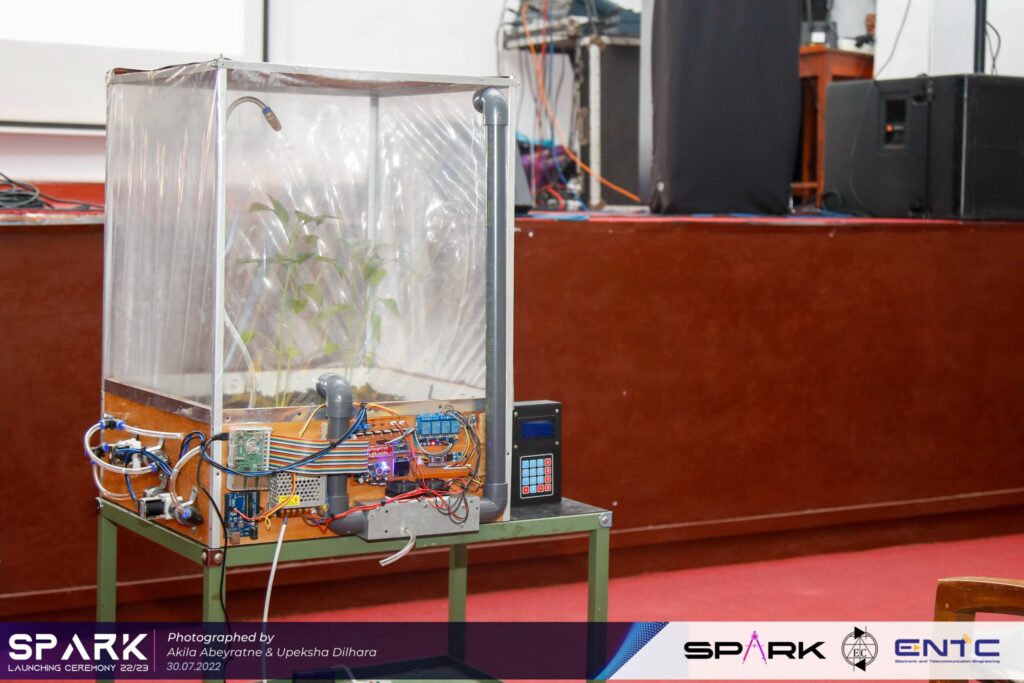
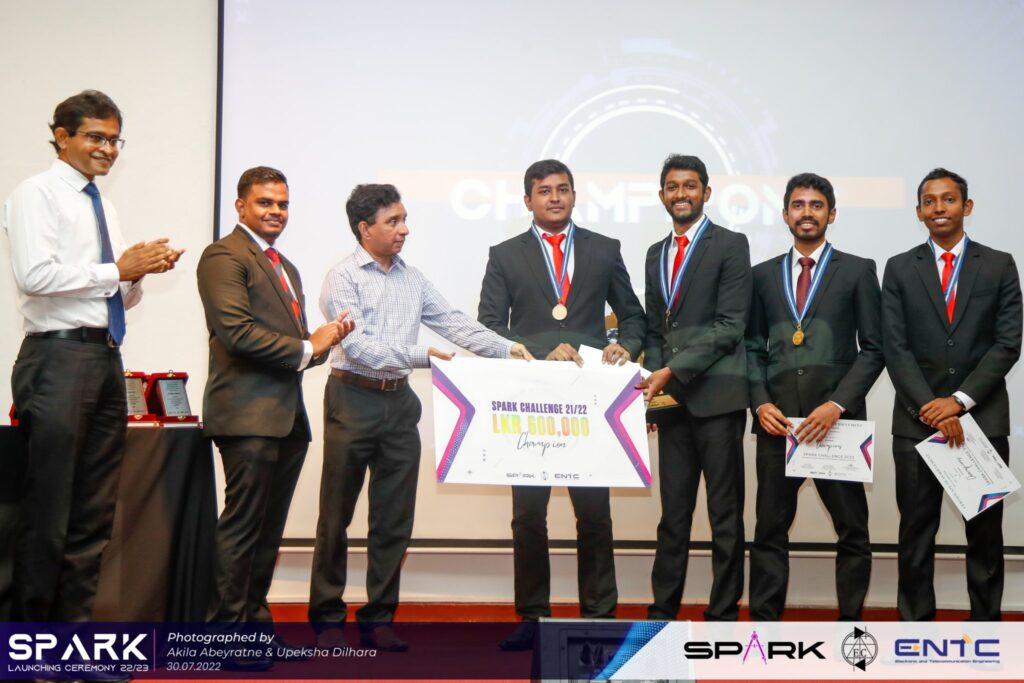
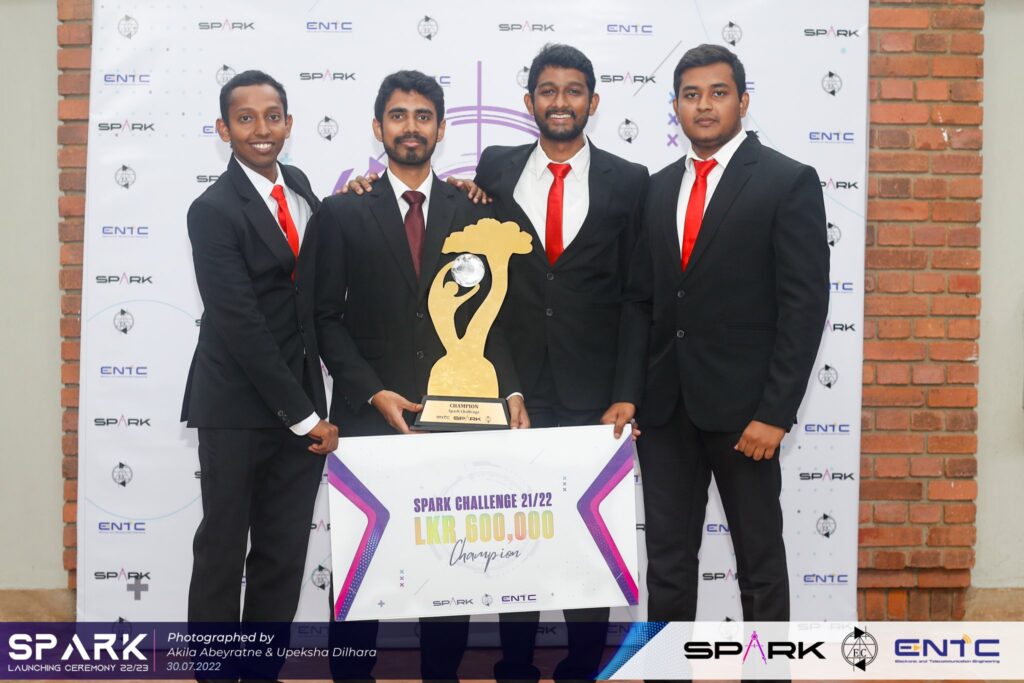
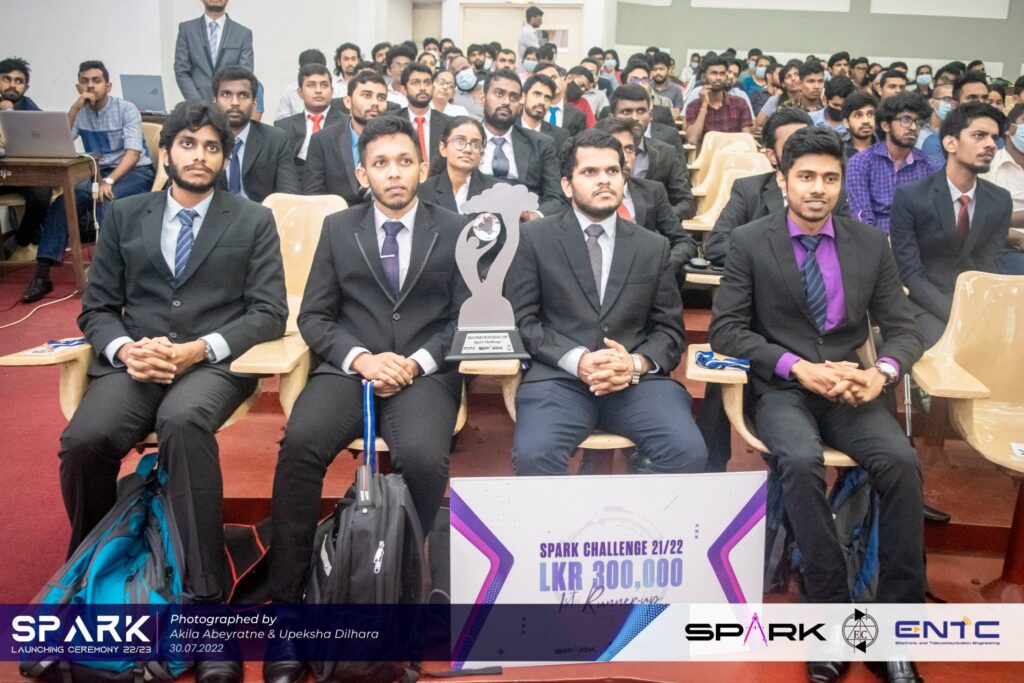
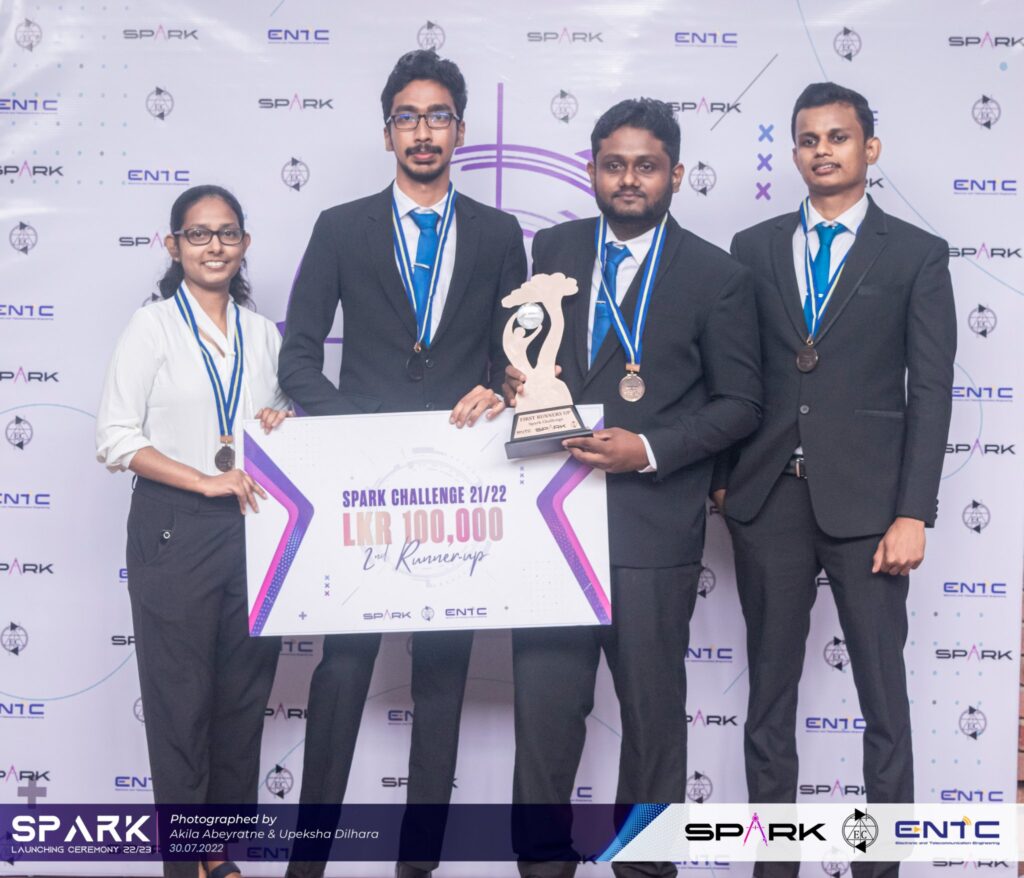
SPARK Pitching Sessions
SPARK project aims to drive projects that solve crucial problems that mankind faces such as climate change, food scarcity, and inequality in education though the application of engineering principles. All these are important aspects of the 17 Sustainable Development Goals (https://sdgs.un.org/goals). Approximately 35 student teams worked on developing solutions to problems that address one or more such goals. Ten groups were able to propose fully-developed ideas and make prototypes. This was possible after a long-term training provided by SAPRK with the involvement of foreign trainers.
As the culmination of this year-long process, the ten groups pitched their projects to an eminent panel of judges comprising Mr. Heminda Jayaweera, Mr. Fayaz Hudah, Mr. Chalinda Abeykon and Mr. Josh Robsen. This pitching session took place on July 24, 2022 at the Department of Electronic and Telecommunication Engineering in a vibrant setting with many students and staff members watching and deliberating about the possible impact of the projects.
Read MoreTeam AP116 wins Silver Award in the Grand Finals of InnovateFPGA Design Contest 2021/22
Team AP116, representing Pahan Mendis, Chathuni Wijegunawardana and Pamuditha Somarathne from the Department of Electronics and Telecommunication Engineering, has won the Gold Award in the Asia Pacific and Japan(APJ) region and the Silver Award from the whole world in InnovateFPGA Design Contest 2021/22. The team was guided by Dr. Ajith Pasqual as a faculty advisor and Mr. Abarajithan Gnaneswaran and Mr. Kithmin Wickramasinghe. This is the first time that a team from Sri Lanka has received one of top three prizes in this competition.
The InnovateFPGA Design Contest is a global competition based on Intel FPGAs, which is organized by Terasic Inc. with the collaboration of Intel Cooperation, Analog Devices, Microsoft as diamond sponsors and Digi-key, Mouser Electronics, Arrow Electronics and Macnica as gold sponsors. The theme for this year’s competition was ‘Connecting the edge for a sustainable future’. The teams were encouraged to utilize Intel FPGA Cloud Connectivity Kit, Microsoft Azure IoT and Analog Devices Plug-in boards in their projects.
To address these objectives, our team brought forth a concept of the Green Machine, a smart, user-friendly, domestic mini-greenhouse system to enable users to grow and efficiently monitor and tend to plants with much ease. This is suitable for domestic users to grow their own food in their homes. Also, due its modular design, the farmers can combine multiple units of Green Machines for cultivation in small to large scale farms. The condition within the Green Machine is monitored using a set of sensors and cameras and the sensor and image data is sent to the Terasic DE-10 Nano, a development kit based on Intel CycloneV SoC FPGA, for processing. After the processing, the sensor and image data are transferred to a Cosmos Database System on Microsoft Azure to be analyzed for further optimizations. Our team initially submitted their proposal back in October and got selected to the regional semi-finals along with 74 other teams in the APJ region. Then, they received the Intel Cloud Connectivity Kit with Terasic DE10 Nano Development board and 3 plug-in boards from Analog Devices to develop their project. They submitted a detailed design paper and a demo video in April and got selected to the regional finals. They went through a virtual QnA session with judges from Terasic, Intel, Microsoft and Analog Devices during the regional finals and emerged as the Gold Award Winners in the APJ region. With that, they were invited to the Grand Finals at the Intel Innovation Campus in San Jose, California, USA with 10 other teams around the world. Unfortunately, due to the rising covid cases in California, the Grand Finals later shifted into a virtual format. Nevertheless, our team presented their project with several improvements, to the Grand Finals in June and received much appreciation for its sustainability impact and the project presentation. The event was judged by experts from Terasic, Intel, Microsoft, Analog Devices and Digi-key.
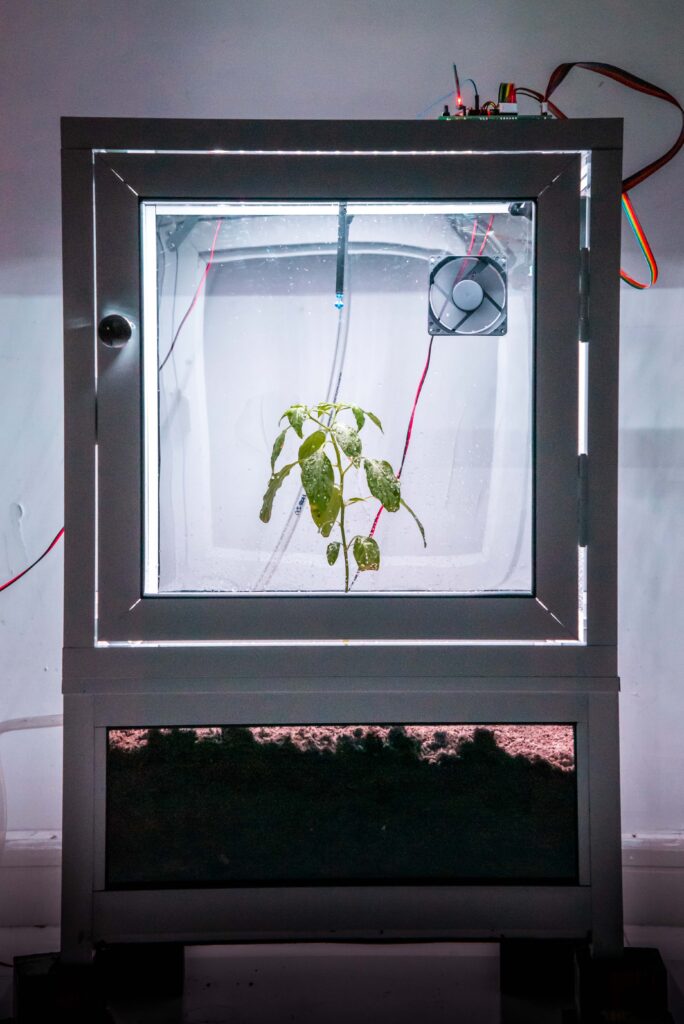
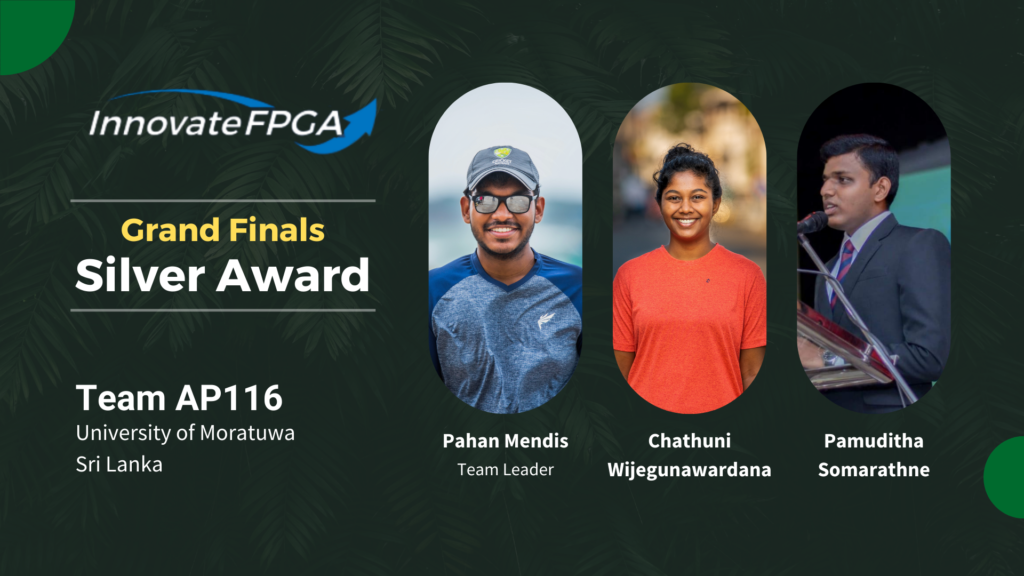
Migara Ratnatunga Trust Award for Industrial Training for Undergraduates 2020/2021
Kalana Abeywardena, an immediate graduate of Department of Electronic and Telecommunication Engineering, University of Moratuwa, won the Migara Ratnatunga Trust Award (All island 1st place – Category A) for the year 2020/2021 which was awarded by the Institution of Engineers, Sri Lanka (IESL) for the best Electronic and Telecommunication Engineering trainee who portrayed excellent performance at Industrial Training. The award (a cash prize and certificate) was presented at the IESL induction and graduation ceremony on Friday, June 17, 2022.
Kalana completed his 6 months industrial training at the School of Computer Science of the University of Sydney, Australia as a Visiting Research Student under the supervision of Dr. Suranga Seneviratne in 2019. During the training, he was mainly engaged in two projects: he developed a cyber security framework to address phishing attacks on websites using computer vision and artificial intelligence and worked on depth filters and artificial intelligence to process Light Field signals to improve their signal power. Moreover, he worked as an undergraduate assistant in a summer program organized by the University of Sydney for international students from China.
Migara Ratnatunga Trust Award is awarded to the high achievers of level 3 industrial training module at the Annual sessions of IESL. The results of the evaluations done by the university training division will be submitted to the IESL, where a few undergraduates would be recognized as high achievers in the compulsory industrial training module in the engineering undergraduate program after a rigorous evaluation among the undergraduates of other state universities.
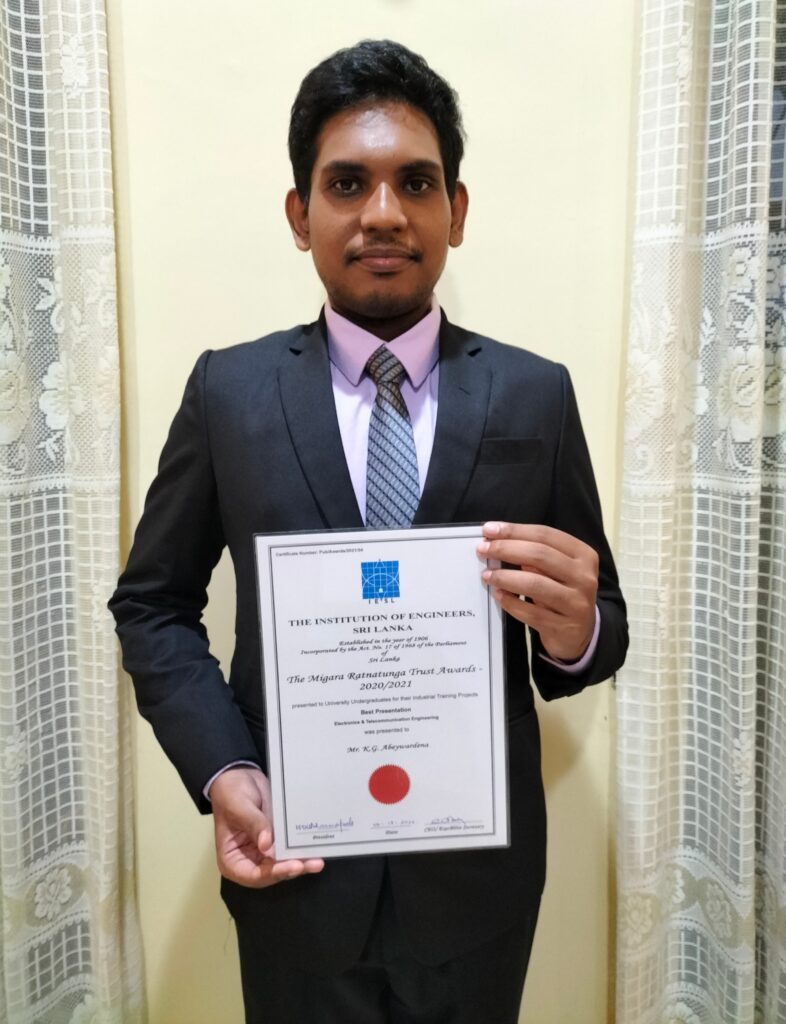
Team University of Moratuwa Selected as Finalists in the IEEE International Future Energy Challenge 2022
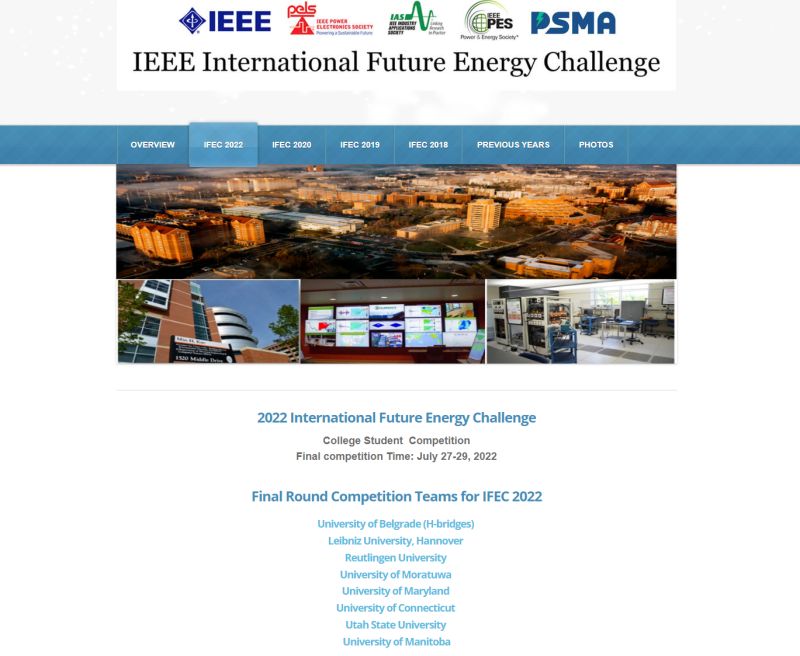
A team of undergraduates from the Dept. of Electronic and Telecommunication Engineering and Dept. of Electrical Engineering at the University of Moratuwa has been selected for the Grand Finals of the IEEE International Future Energy Challenge 2022 for the first time in Sri Lanka. This is a prestigious power electronics competition organized by the Institute of Electrical and Electronics Engineers (IEEE) and sponsored by the IEEE Power Electronics Society, IEEE Industry Application Society, IEEE Power and Energy Society and Power Source Manufacturers’ Association.
The team advisors:
Prof. Udayanga Hemapala – Head Department of Electrical Engineering
Dr. Subdoha Charles – Senior Lecturer at the Department of Electronic and Telecommunication Engineering
Mr. Thilina Ambagahawaththa – Lecturer at the Department of Electronic and Telecommunication Engineering
Mr. Iresh Jayawardana – Graduate of the Department of Electronic and Telecommunication Engineering
The team members from the Department of Electronic and Telecommunication Engineering:
Pahan Mendis – Team Leader
Pamuditha Somarathne
Punsara Mahawela
Ransara Wijitharathna
Dineth Mudalige
Chathuni Wijegunawardana
Hiruni Wijewardena
Nikeshi Kumarasinghe
Limalka Sadith
Supun Kuruppu
Biyon Fernando
The team members from the Department of Electrical Engineering:
Nawanjana Yesith
Geshan Sudasinghe
For this competition, the team designed a smart efficient and light microgrid inverter that converts DC power from a solar panel into AC. Since 2010, solar costs have declined 70% to 80% in the world, making solar one of the most economical ways for energy generation. However, integrating renewable and distributed energy resources, such as photovoltaics (PV) and energy storage devices, into the electrical applications requires advanced power electronics, or smart inverters, that provide efficient and reliable power management. The team target to achieve an efficiency greater than 95% and a bulk manufacturing cost less than $200 in their inverter.
The team progressed through the initial selection round where they submitted their proposal for the inverter that caters the set of given specifications. During the semi-final round, 13 teams from prestigious universities in the world demonstrated their hardware design of the proposed inverter. Our team from University of Moratuwa, along with 7 other teams from Europe, Canada, and America, have been selected for the grand finals based on the technical quality of the design and the progress of hardware implementation demonstrated in the semi-final round. The final competition will be held between 27th-29th of July 2022 at University of Tennessee, Knoxville, USA.
The complete hardware prototype of the inverter will be tested for its performance in front of judges and industry experts at the grand finals. A group of students representing the Team UoM is planning to visit the USA with the designed inverter for this final competition.
Read MoreSecond-place Winner of the ComSoc “Internet for All” Competition in the Asia Pacific Region
Sandushan Ranaweera, and undergraduate of ENTC has emerged as the second-place winner in the Asia Pacific Region in the Internet for All Competition organized by IEEE Communications Society which is one of the world premier associations for communication engineers.
In this competition the participating teams or individuals are required to submit a proposal outlining a plan to bring internet connectivity to an identified locality where a clear need of internet connectivity exists. The proposals should explain how if implemented the performance of the infrastructure will be measured, detect technical failures, risk mitigation plan and how the infrastructure will be maintained after the project duration.
Teams or individuals from worldwide were open to submit proposals. Winners were selected region-wise from Europe, Middle East and Africa Region, North America Region, Latin America Region and Asia Pacific Region. The jury picked First, Second, Third place winners with up to 5 honorable mentions per each region. Sandushan Ranaweera’s proposal which won the second place in Asia Pacific Region was outlined a project to give internet connectivity for underprivileged students in rural villages of Sri Lanka using existing common infrastructure.
The constant motivation and guidance of Dr. Tharaka Samarasinghe as the staff advisor of the IEEE Communications Society Student Branch Chapter should be appreciated here since he always encourages students to participate in these competitions. This achievement will uplift the brand name of ENTC and UoM while showcasing the practical industrial knowledge of ENTC undergraduates in international level.
Read MoreNBQSA 2021 Results
The final year project titled “Object Detection, Tracking and Suspicious Activity Recognition for Maritime Surveillance using Thermal Vision” received the Bronze award for Tertiary Students – Technology category at National ICT Awards NBQSA 2021.
NBQSA, The National ICT Awards Ceremony, provides recognition to outstanding achievements of individuals and organizations in Sri Lanka who have developed high quality ICT products and Tertiary Category – Technology targets the best quality work done by undergraduates in terms of research related to technical solutions.
The award was given for the technological solution provided when it comes to maritime surveillance in Sri Lankan borders and due to the amount of research work carried out during the project which includes a novel approach to Online Real-time Spatio Temporal Action Localization.
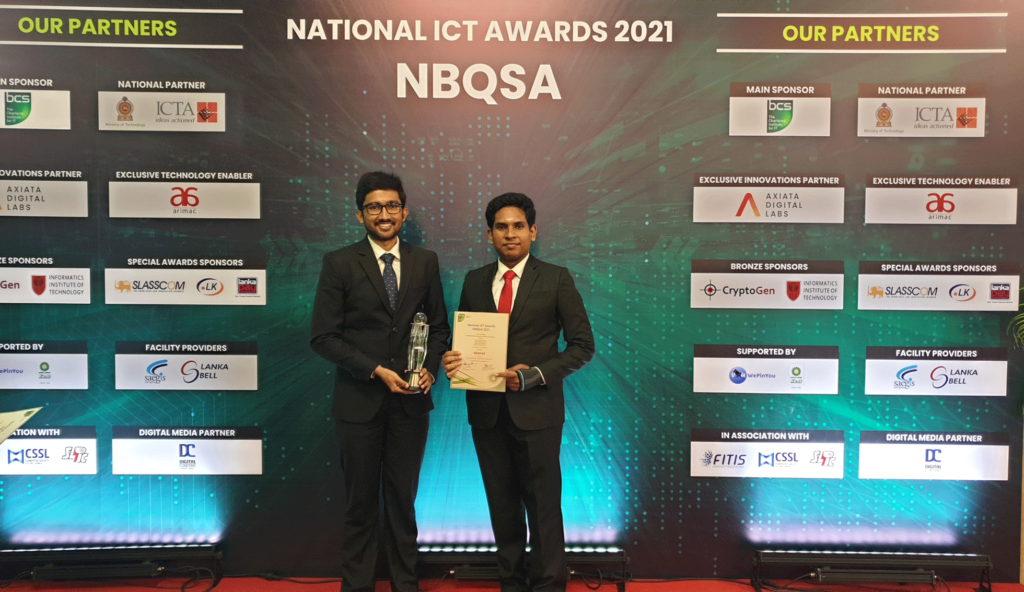

B.Sc. Engineering Honours Degree in Electronic and Telecommunication Engineering Receives Full Accreditation
In response to the application for reaccreditation submitted to the Institution of Engineers, Sri Lanka (IESL), the B.Sc. Engineering Honours Degree in Electronic and Telecommunication Engineering of the Department of Electronic and Telecommunication Engineering of the University of Moratuwa has been granted full accreditation for the intake till 2023.
According to the IESL’s official website, “[IESL] being a signatory to the Washington Accord, the four-year full-time engineering degree programmes accredited by the IESL will be considered as substantially equivalent to four-year engineering degree programmes that have been accredited by the other signatories to the Washington Accord. A signatory to the Washington Accord is empowered by the Accord to accredit only those degree programmes conducted within the jurisdiction (country) of the signatory.”
https://iesl.lk/index.php?option=com_content&view=article&id=126&Itemid=170&lang=en
More information on the Washington Accord: https://www.ieagreements.org/accords/washington/
Read MoreResearch paper acceptance at IEEE/CVF WACV 2022
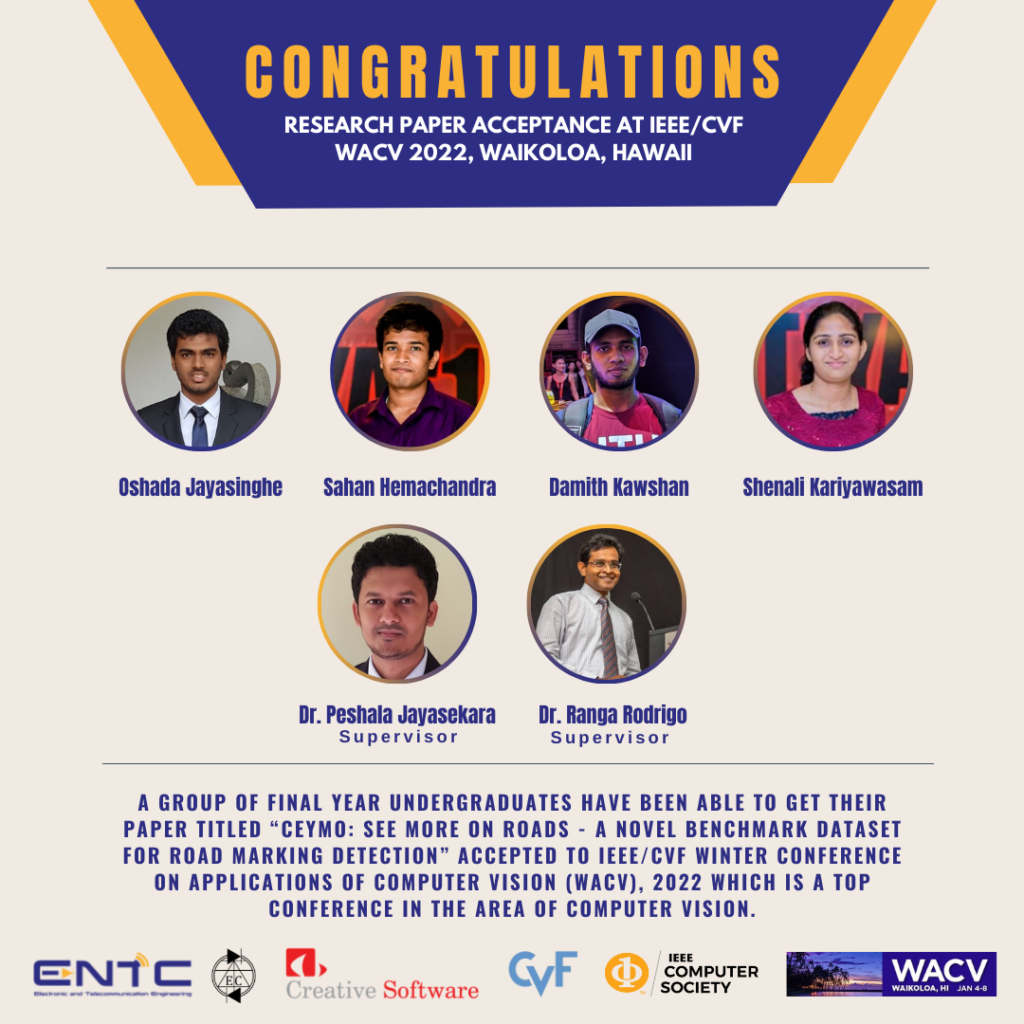
A research paper titled “CeyMo: See More on Roads – A Novel Benchmark Dataset for Road Marking Detection” has been accepted to the IEEE/CVF Winter Conference on Applications of Computer Vision (WACV), 2022. The research was conducted by Oshada Jayasinghe, Sahan Hemachandra, Damith Anhettigama, and Shenali Kariyawasam under the supervision of Dr. Peshala Jayasekara and Dr. Ranga Rodrigo.
The paper introduces a novel road marking benchmark dataset for road marking detection in advanced driver assistance systems and autonomous vehicles. Though understanding road markings is a fundamental perception task in autonomous vehicles, the development of robust road marking detection algorithms has been a challenging task in the research community due to diverse road, illumination, and traffic scenarios. The introduced dataset covers a wide variety of urban, sub-urban, and rural road scenarios with diverse illumination and weather conditions. The multiple annotation formats and the clear evaluation metrics with the evaluation script will promote novel road marking detection algorithms and direct comparison of them. Furthermore, the authors evaluate the approaches of utilizing instance segmentation-based and object detection-based neural network architectures for the road marking detection task, which will facilitate future research on road marking detection in challenging environments.
WACV is a top international conference in the field of computer vision and pattern recognition organized annually by the IEEE Computer Society and the Computer Vision Foundation. WACV 2022 will be held from 4th to 8th of January 2022 in Waikoloa, Hawaii, USA. This research was carried out as a final year project at the Department of Electronic and Telecommunication Engineering (ENTC), University of Moratuwa in collaboration with Creative Software Pvt. Ltd.
Team NIMA from ENTC wins 3rd place in Physionet/CinC Challenge 2021
Nima L. Wickramasinghe from the Department of Electronic and Telecommunication Engineering (ENTC), together with his mentor Mohamed Athif from the Department of Biomedical Engineering, Boston University (previously an undergraduate at ENTC) has won the 3rd place in 3 categories (All-lead, 3-lead, 2-lead) in the Physionet/Computing in Cardiology Challenge 2021.
PhysioNet supports challenges, which invite participants from all over the world from various institutes to tackle clinically interesting questions that are either unsolved or not well-solved. In cooperation with the Computing in Cardiology conference, PhysioNet has been co-hosting a challenge annually. This year, the conference was held in Brno, Czech Republic from 12th to 15th of September in a hybrid manner. Computing in Cardiology (formerly Computers in Cardiology) is an international scientific conference that has been held annually since 1974. CinC provides a forum for scientists and professionals from the fields of medicine, physics, engineering, and computer science to discuss their current research in topics pertaining to computing in clinical cardiology and cardiovascular physiology.
This year’s challenge was to identify Cardiac abnormalities (26 scored) given the ECG data of the patients. Usually, the ECG data consists of the signals from the 12-leads. But, this year’s challenge focused on whether the same accuracy can be achieved using reduced-lead ECG data. Using a smaller number of leads would enable low-cost, portable, and user-friendly point of care devices.
The team (team NIMA) proposed a novel solution to tackle this Multi-label classification problem by creating a Deep convolutional neural network that used the time domain and frequency domain of the ECG signals to classify the 26 scored cardiac abnormalities. The results showed that reduced-lead ECG data can obtain almost the same accuracy obtained using all leads.
The team was able to obtain 3rd place in the All-lead, 3-lead, and 2-lead categories competing against 39 International teams. The 2nd place was obtained by team DSAIL_SNU, mainly from Seoul National University. And, the 1st place was obtained by team ISIBrno-AIMT, mainly from the Institute of Scientific Instruments of the Czech Academy of Sciences, Brno, Czech Republic.
Remarks: The collaboration between Nima L. Wickramasinghe and Athif Mohamed was facilitated by the ScholarX program from the Sustainable Education Foundation. ScholarX is a 6-month program for Sri-Lankan undergraduates who would like to get free premium mentoring during their study period.
Link to challenge: https://physionetchallenges.org/2021/
Link to video: https://www.linkedin.com/posts/nima-wickramasinghe-9b71a1205_innovation-research-activity-6844151633757171712–afB
Read More
